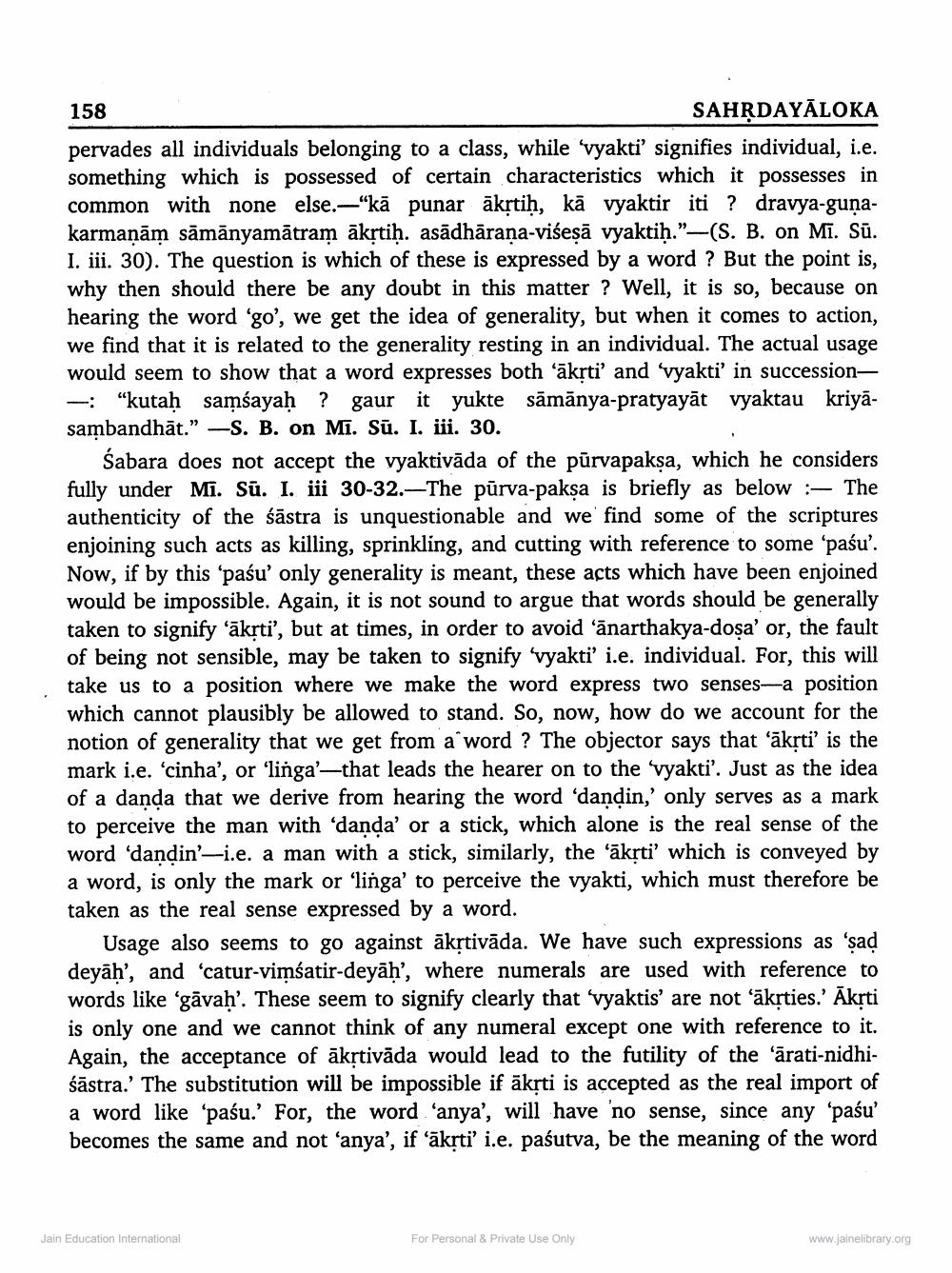________________
158
SAHRDAYĀLOKA pervades all individuals belonging to a class, while 'vyakti' signifies individual, i.e. something which is possessed of certain characteristics which it possesses in common with none else.—"kā punarakrtih, kā vyaktir iti? dravya-gunakarmanām sāmānyamātram ākrtih. asādhārana-višesā vyaktih.”—(S. B. on Mī. Sū. I. iii. 30). The question is which of these is expressed by a word ? But the point is, why then should there be any doubt in this matter? Well, it is so, because on hearing the word 'go', we get the idea of generality, but when it comes to action, we find that it is related to the generality resting in an individual. The actual usage would seem to show that a word expresses both 'ākřti' and 'vyakti' in succession
- "kutah samśayah ? gaurit yukte sāmānya-pratyayāt vyaktau kriyasambandhāt.” -S. B. on Mi. Sū. I. iii. 30.
Sabara does not accept the vyaktivāda of the pūrvapaksa, which he considers fully under Mi. Sū. I. iii 30-32.-The pūrva-paksa is briefly as below :- The authenticity of the śāstra is unquestionable and we find some of the scriptures enjoining such acts as killing, sprinkling, and cutting with reference to some 'paśu'. Now, if by this 'pasu' only generality is meant, these acts which have been enjoined would be impossible. Again, it is not sound to argue that words should be generally taken to signify ‘āksti', but at times, in order to avoid 'ānarthakya-dosa' or, the fault of being not sensible, may be taken to signify 'vyakti' i.e. individual. For, this will take us to a position where we make the word express two senses-a position which cannot plausibly be allowed to stand. So, now, how do we account for the notion of generality that we get from a word ? The objector says that 'ākrti' is the mark i.e. 'cinha', or 'linga'—that leads the hearer on to the vyakti'. Just as the idea of a danda that we derive from hearing the word 'dandin,' only serves as a mark to perceive the man with ‘danda' or a stick, which alone is the real sense of the word 'dandin'-i.e. a man with a stick, similarly, the 'ākrti' which is conveyed by a word, is only the mark or 'linga' to perceive the vyakti, which must therefore be taken as the real sense expressed by a word.
Usage also seems to go against akrtivāda. We have such expressions as 'sad deyāh', and 'catur-vimsatir-deyāḥ', where numerals are used with reference to words like 'gāvah'. These seem to signify clearly that "vyaktis' are not 'ākrties. Āksti is only one and we cannot think of any numeral except one with reference to it. Again, the acceptance of ākřtivāda would lead to the futility of the "ārati-nidhiśāstra.' The substitution will be impossible if äkrti is accepted as the real import of a word like 'paśu.' For, the word 'anya', will have 'no sense, since any 'paśu' becomes the same and not 'anya', if 'akrti' i.e. paśutva, be the meaning of the word
Jain Education International
For Personal & Private Use Only
www.jainelibrary.org




